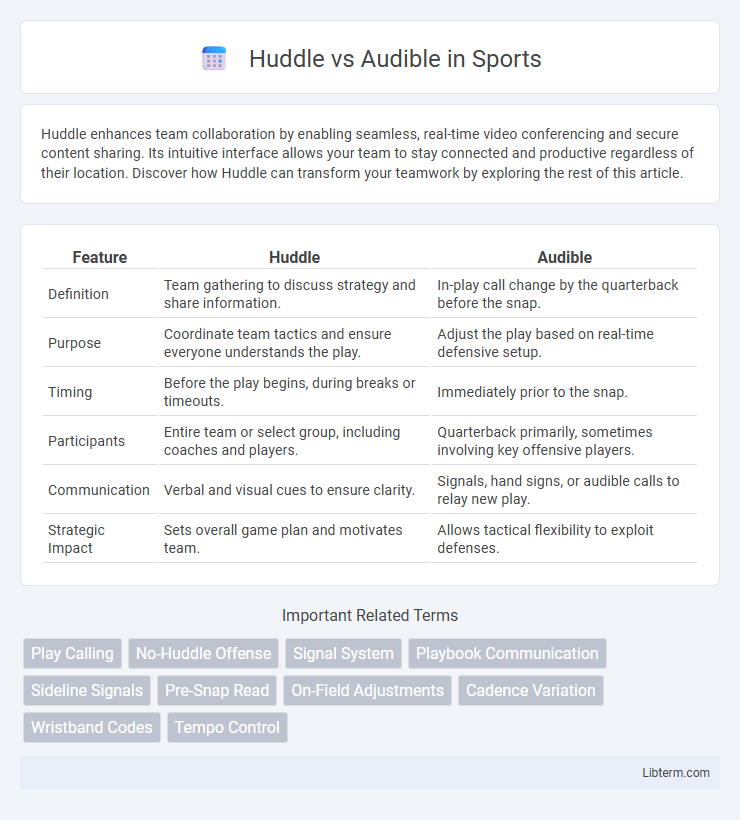Huddle enhances team collaboration by enabling seamless, real-time video conferencing and secure content sharing. Its intuitive interface allows your team to stay connected and productive regardless of their location. Discover how Huddle can transform your teamwork by exploring the rest of this article.
Table of Comparison
| Feature | Huddle | Audible |
|---|---|---|
| Definition | Team gathering to discuss strategy and share information. | In-play call change by the quarterback before the snap. |
| Purpose | Coordinate team tactics and ensure everyone understands the play. | Adjust the play based on real-time defensive setup. |
| Timing | Before the play begins, during breaks or timeouts. | Immediately prior to the snap. |
| Participants | Entire team or select group, including coaches and players. | Quarterback primarily, sometimes involving key offensive players. |
| Communication | Verbal and visual cues to ensure clarity. | Signals, hand signs, or audible calls to relay new play. |
| Strategic Impact | Sets overall game plan and motivates team. | Allows tactical flexibility to exploit defenses. |
Overview of Huddle and Audible
Huddle is a cloud-based collaboration platform designed to streamline document sharing, project management, and team communication for businesses of all sizes. Audible, an Amazon company, specializes in providing a vast marketplace for audiobooks, podcasts, and spoken-word entertainment, catering primarily to individual users and audiobook enthusiasts. Both platforms prioritize user engagement but serve fundamentally different purposes--Huddle excels in secure enterprise collaboration while Audible focuses on rich audio content delivery.
Key Features Comparison
Huddle offers robust document collaboration features, including real-time editing, version control, and task management, designed for seamless team productivity. Audible specializes in high-quality audiobooks and podcasts, providing a vast library with exclusive content and personalized recommendations. While Huddle focuses on enhancing workplace collaboration, Audible caters primarily to entertainment and learning through audio formats.
Content Library Analysis
Huddle offers a content library with over 5,000 audiobooks, podcasts, and exclusive series tailored for corporate training and professional development, emphasizing niche business topics and timely industry insights. Audible provides an extensive library exceeding 500,000 titles, spanning a vast range of genres including fiction, nonfiction, and self-improvement, catering to general entertainment and personal growth. While Huddle focuses on curated, goal-oriented learning materials, Audible's vast and diverse catalog supports broad user interests and comprehensive audio content consumption.
User Experience and Interface
Huddle offers a streamlined user interface designed for seamless collaboration, featuring intuitive navigation and customizable workspaces that enhance team productivity. Audible provides a rich auditory experience with an easy-to-use app interface optimized for audiobook discovery, playback, and personalized recommendations. Both platforms prioritize user engagement but cater to different needs: Huddle excels in interactive project management, while Audible focuses on immersive listening experiences.
Pricing and Subscription Plans
Huddle offers tiered pricing plans starting at $10 per user per month, designed for collaborative workspaces, with features scaled by the plan such as advanced security and integration options. Audible provides a subscription model at $14.95 per month, granting one credit for any audiobook plus discounts on additional purchases without a contract commitment. Huddle's pricing emphasizes team collaboration tools, while Audible focuses on individual audiobook access through a credit-based subscription.
Device Compatibility
Huddle offers extensive device compatibility, including iOS, Android, and desktop platforms, ensuring seamless access across smartphones, tablets, and computers. Audible supports a wide range of devices such as iOS, Android, Windows, macOS, Kindle, and compatible smart speakers like Amazon Echo. Both services provide offline listening options, but Audible's integration with Amazon devices offers a distinctive advantage for Amazon ecosystem users.
Offline Access and Download Options
Huddle offers robust offline access with the ability to download documents and files directly to devices, ensuring seamless collaboration without internet connectivity. Audible provides downloadable audiobooks and podcasts for offline listening, with extensive options for managing downloads across devices. Both platforms prioritize user flexibility, but Huddle emphasizes document accessibility, while Audible specializes in audio content consumption.
Unique Selling Propositions
Huddle offers a collaborative workspace with real-time document editing and team communication features designed for enhanced productivity and streamlined project management. Audible provides a vast selection of audiobooks and exclusive audio content with seamless integration on multiple devices, catering mainly to users seeking entertainment and education on the go. Huddle's unique selling proposition lies in facilitating teamwork and secure file sharing, while Audible excels in delivering high-quality, diverse audio narratives and original podcasts.
Target Audience and Use Cases
Huddle targets professionals and teams seeking secure document collaboration and streamlined workflow management, ideal for industries like legal, finance, and government. Audible serves audiobook enthusiasts, commuters, and readers preferring audio formats for entertainment, education, and multitasking. Huddle's use cases emphasize document sharing, version control, and project collaboration, while Audible focuses on providing extensive audiobook libraries and personalized listening experiences.
Pros and Cons of Huddle vs Audible
Huddle offers robust team collaboration tools and a secure environment for document sharing, making it ideal for businesses focused on project management, while Audible excels in delivering a vast library of audiobooks with high-quality narration and personalized recommendations. Huddle's cons include a steeper learning curve and higher cost, whereas Audible's limitations involve fewer collaborative features and subscription restrictions on content access. Choosing Huddle benefits users needing enhanced workflow integration, whereas Audible suits those seeking an extensive personal audiobook collection.
Huddle Infographic

 libterm.com
libterm.com